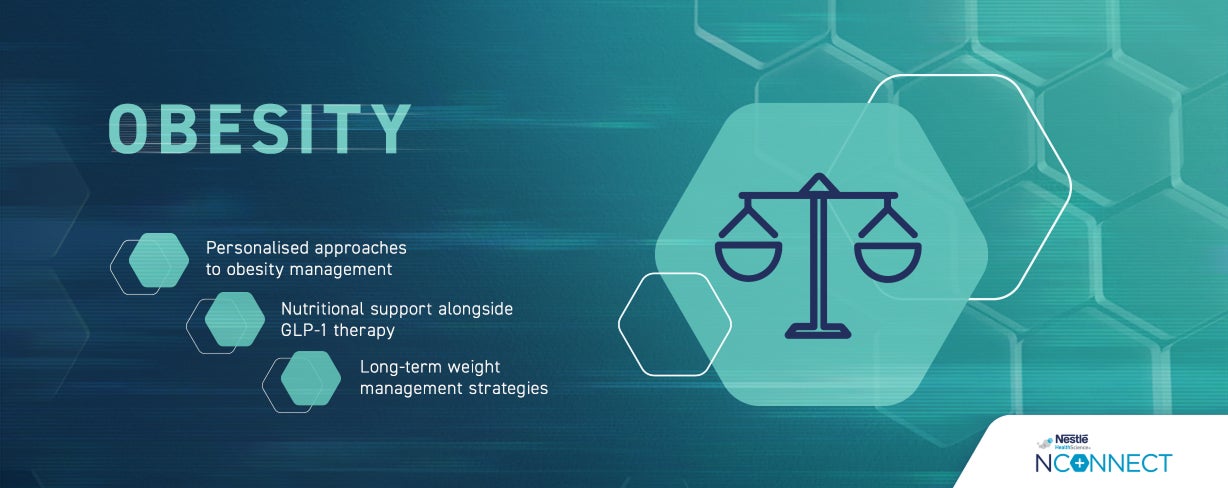Obesity
16 Results found
Highlight of the month

Butsch WS et al. 2025 Nutritional deficiencies and muscle loss in adults with type 2 diabetes using GLP-1 receptor agonists: A retrospective observational study
In this retrospective observational study it examines the increased nutritional risks in adults who undergo GLP-1 RA therapy, including those with type 2 diabetes, prediabetes, and obesity.
See moreThis retrospective review evaluates real world clinical experience of concomitant use of meal replacement products and GLP-1 RAs in Australia and South Africa. The results illustrate that this combination for weight management is feasible in real-life and may offer potential advantages for weight management.
This study aimed to determine the demographic, eating, self‐efficacy and program engagement characteristics of VLCD users in Australia (regular vs. intermittent users) and associations with self‐perceived program success on weight loss, quality of life (QOL), mental health and physical health.
Learn about new Australian clinical evidence on the impact of the very low energy diets for Type 2 Diabetes remission. The DiRECT-Aus trial confirms that that an intensive lifestyle intervention (very low energy diet) delivered in an Australian primary care setting to individuals with recently diagnosed type 2 diabetes results in remission for one in two participants. The study was supported by Diabetes Australia (not-for-profit organisation), and 5 public health networks. Nestlé Health Science donated OPTIFAST VLCD product for the duration of the trial. Click here to view the video.
Proceedings from a webinar from the 81st American Diabetes Association discusses the current and emerging novel non-pharmacological approaches to the prevention and remission of type 2 diabetes, weight management, and CV risk reduction.
Videos
This video abstract provides an overview of DiRECT-Aus trial, which confirms that an intensive lifestyle intervention (very low energy diet) delivered in an Australian primary care setting results in remission of type 2 diabetes for one in two participants.
External Link
This research explores participant acceptability, adherence, safety, and experiences of using a short-term total diet replacement and a food-based low energy diet in adults living with chronic kidney disease and obesity.
Markovic, TP. et al 2022 An algorithm has been developed to (i) assist primary care physicians in treatment decisions for non-pregnant adults with obesity, and (ii) provide a practical clinical tool to guide the implementation of existing guidelines for the treatment of obesity in the Australian primary care setting.
Type 2 diabetes mellitus (T2DM) and non-alcoholic fatty liver disease (NAFLD) are highly prevalent diseases associated with an increased risk of morbidity and mortality. Obesity/overweight and dietary intake are important risk factors. Jamy Ard focused on the benefits of meal replacements to promote increased weight loss and increased rates of T2DM remission. Wajahat Mehal discussed sustained weight loss and improved liver health and focused on meal replacements and very-low-calorie diets (VLCD)for the management of NAFLD/NASH.
This pilot randomised control trial tests the feasibility and potential efficacy of remotely supported intermittent low-energy diets (ILEDs) and continuous low-energy diets (CLEDs) in people with type 2 diabetes (T2D). The study demonstrated feasibility and efficacy for remote ILEDs and CLEDs for weight loss and HbA1c reduction.
A randomised controlled trial which investigated the rate of weight loss on the rate of regain in people who are obese (fast versus slow weight loss). The interpretation of the results were that the rate of weight loss does not affect the proportion of weight regained within 144 weeks. These findings are not consistent with present dietary guidelines which recommend gradual over rapid weight loss, based on the belief that rapid weight loss is more quickly regained.
A review and meta-analysis of the benefits of weight management for those who are at risk or have type 2 diabetes. As obesity is a major risk factor for development of diabetes, a systematic review of the medical literature to assess the impact of obesity and weight gain on risk of diabetes and CHD was conducted.
A randomised control trial investigating the use of energy restricted diets delivered through primary care channels, with the aim of achieving remission for people with type 2 diabetes. Findings show that, at 12 months, almost half of participants on a total diet replacement program achieved diabetes remission.
This review paper addresses questions surrounding the use of very low energy diets (VLEDs) for the management of overweight/obesity. It discusses fast versus slow weight loss and long-term results, as well advantages of VLEDs, side effects, and how it should be used. Behavioural change, active follow-up and pharmacotherapy are also discussed for optimal results.
This review paper explores the properties and current status of very low energy diets (VLEDs) in the management of obesity. VLEDs are defined as diets which contain energy levels of less than 3.4MJ (800kcal) per day and contain daily allowances of all essential nutritional requirements and have been used in clinical settings for over 20 years.
A very low energy diet (VLED) can result in substantial, rapid weight loss and is increasingly prescribed before obesity surgery to minimise risk and difficulty by reducing liver size and abdominal adiposity. This observational study demonstrates the efficacy of using a VLED pre-bariatric surgery for 2-6 weeks.




